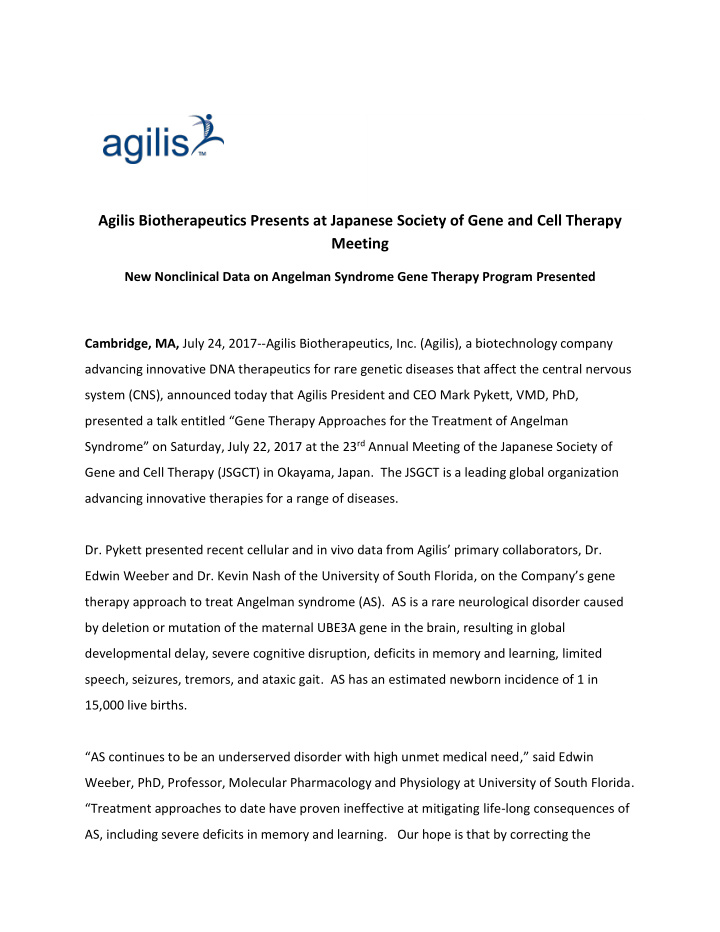



Agilis Biotherapeutics Presents at Japanese Society of Gene and Cell Therapy Meeting New Nonclinical Data on Angelman Syndrome Gene Therapy Program Presented Cambridge, MA, July 24, 2017--Agilis Biotherapeutics, Inc. (Agilis), a biotechnology company advancing innovative DNA therapeutics for rare genetic diseases that affect the central nervous system (CNS), announced today that Agilis President and CEO Mark Pykett, VMD, PhD, presented a talk entitled “Gene Therapy Approaches for the Treatment of Angelman Syndrome” on Saturday, July 22, 2017 at the 23 rd Annual Meeting of the Japanese Society of Gene and Cell Therapy (JSGCT) in Okayama, Japan. The JSGCT is a leading global organization advancing innovative therapies for a range of diseases. Dr. Pykett presented recent cellular and in vivo data from Agilis ’ primary collaborators, Dr. Edwin Weeber and Dr. Kevin Nash of the University of South Florida, on the Company’s gene therapy approach to treat Angelman syndrome (AS). AS is a rare neurological disorder caused by deletion or mutation of the maternal UBE3A gene in the brain, resulting in global developmental delay, severe cognitive disruption, deficits in memory and learning, limited speech, seizures, tremors, and ataxic gait. AS has an estimated newborn incidence of 1 in 15,000 live births. “AS continues to be an underserved disorder with high unmet medical need,” said Edwin Weeber, PhD, Professor, Molecular Pharmacology and Physiology at University of South Florida. “ Treatment approaches to date have proven ineffective at mitigating life-long consequences of AS, including severe deficits in memory and learning. Our hope is that by correcting the
underlying genetic deficit of AS, gene therapy may provide a long-term treatment option for these patients. Our laboratory has studied AS for over a decade, and we believe we are making important progress toward a first- ever gene therapy trial for this disease.” Using the gold-standard murine knock-out model for AS, a series of adeno-associated virus (AAV) vectors were tested in combination with different routes of administration to deliver the human UBE3A gene to the central nervous system (CNS) and assess biodistribution. Encouraging evidence showing widespread distribution was obtained with several vectors and dosing routes, including demonstration of robust localization to key target structures in AS such as the hippocampus, the major site of memory and learning. Levels of localization with certain vector-delivery combinations were associated with physiologic improvement in neuronal function, as shown by in situ assessments of hippocampal electrophysiology revealing restoration of long-term potentiation (LTP), a key measure of neuronal activity believed to be important in memory and learning. Restoration of LTP, in turn, was correlated with recovery of functional capabilities affected in the AS mouse model and characteristic of AS patients, including improvements in standard tests of memory and learning. These findings validate and extend earlier proof-of-concept studies published by Dr. Weeber and colleagues and provide support for further development of the Company’s CNS-targeted AAV approach toward human clinical trials. “ We were pleased to participate in the JSGCT Annual Conference and present recent progress on our AS program toward the selection of our therapeutic lead, which we expect to take into IND-enabling studies later this year, ” said Dr. Pykett. “ We were thrilled to share our promising developments in the treatment of AS, a debilitating, lifelong disease, for which treatment options are severely limited .” About Angelman syndrome Angelman syndrome is a rare genetic disorder caused by the deletion/mutation of the UBE3A gene. The UBE3A gene encodes the ubiquitin ligase E6-AP, a protein that plays a critical role in
the function of the central nervous system. Characteristic features of the condition include delayed development, intellectual disability, severe speech impairment, seizures and ataxia, resulting in chronic disability and the need for lifelong care. According to FAST (The Foundation for Angelman Syndrome Therapeutics), the disorder affects an estimated 1 in 15,000 live births. About Agilis Biotherapeutics, Inc. Agilis is advancing innovative gene therapies designed to provide long-term efficacy for patients with debilitating, often fatal, rare genetic diseases that affect the central nervous system. Agilis’ gene therapies are engineered to impart sustainable clinical benefits by inducing persistent expression of a therapeutic gene through precise targeting and restoration of lost gene function to achieve long-term efficac y. Agilis’ rare disease programs are focused on gene therapy for AADC deficiency, Friedreich’s ataxia, and Angelman syndrome, all rare genetic diseases that include neurological deficits and result in physically debilitating conditions. We invite you to visit our website at www.agilisbio.com Safe Harbor Statement Some of the statements made in this press release are forward-looking statements. These forward-looking statements are based upon our current expectations and projections about future events and generally relate to our plans, objectives and expectations for the development of our business. Although management believes that the plans and objectives reflected in or suggested by these forward-looking statements are reasonable, all forward- looking statements involve risks and uncertainties and actual future results may be materially different from the plans, objectives and expectations expressed in this press release. For more information, contact Agilis Biotherapeutics, Inc. Dr. Jodi Cook Chief Operating Officer Email: jcook@agilisbio.com
Recommend
More recommend